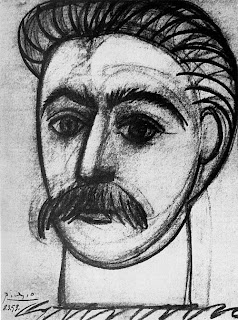
Gori, population 50,000, is in the news because of the escalating war between Russia and Georgia. Its most famous son is Joseph Stalin. In Gori, there is a Stalin Avenue, a Stalin Square, three Stalin statues, including a giant one in front of town hall, and a Stalin Museum, the town's main tourist attraction. Its exhibits mention no Great Terror purges, gulags or mass starvation. The dictator is still a great man in Gori but likely nowhere else, although his cult was once widespread. When Stalin died in 1953, Communist Vietnam's most celebrated poet, Tố Hữu, wrote a hysterical elegy. I translate:
Stalin! Stalin!
A mother showed to her child
A picture of Stalin with a young child
His shirt is white against red clouds
His eyes are kind, his mouth smiling
On an immense green field
He stands with a little child
Wearing a red scarf round his neck
Towards the future they both look
Stalin! Stalin!
How I loved my child's first word
When he said the word Stalin!
The milky fragance of a baby's mouth
Is like the dove of peace and a limpid moon
Yesterday the field speaker blared
Tore my stomach to shreds
O how the village convulsed
O how can it be... He's dead!
O Stalin! O Stalin!
Without you, are there still sky and earth?
The love for my father, mother, wife
The love for myself are but one tenth
Of my love for you
The love for my child, country, race
Can't be greater than my love for you
Before there was only barren desolation
Thanks to you there's brightness and joy
Before only torn clothes and hunger
Thanks to you our rice pots are full
Before only torment and shackles
Thanks to you we have days of freedom
When people have land to till
When independence comes tomorrow
Who will we remember with gratitude?
This gratitude I'll bear on my shoulders
One side for Uncle Ho, one for you
My child, you're still so clueless
But you'll learn to thank Stalin for life
Loving you a mother vowed in silence
To love village, country, husband, child
Although you have disappeared, gone
Your crimson footsteps are forever
Today on the village road at dawn
Incense smoke curled up everywhere
A thousand in mourning white, joined
In wrenching eternal remembrance of you.
 Much superior artists to Tố Hữu, most notably Picasso and Neruda, have tainted themselves by paying homage to a man responsible for 20 to 60 million deaths. Even Albert Einstein refused to condemn Stalin's murder of political prisoners, stating, "The Russians have proved that their only aim is really the improvement of the lot of the Russian people.” Not all major intellectuals got it wrong, of course. During WWII, when the dictator was an ally of Roosevelt and Churchill, an important American poet did declare, "Stalin's regime considers humanity as nothing save raw material. Deliver so many carloads of human material at the consumption point. That is the logical result of materialism. If you assert that men are dirty, that humanity is merely material, that is where you come out. And the old Georgian train robber is perfectly logical. If all things are merely material, man is material--and the system of anti-man treats man as matter"--Ezra Pound. What Pound got wrong have been amply broadcast.
Much superior artists to Tố Hữu, most notably Picasso and Neruda, have tainted themselves by paying homage to a man responsible for 20 to 60 million deaths. Even Albert Einstein refused to condemn Stalin's murder of political prisoners, stating, "The Russians have proved that their only aim is really the improvement of the lot of the Russian people.” Not all major intellectuals got it wrong, of course. During WWII, when the dictator was an ally of Roosevelt and Churchill, an important American poet did declare, "Stalin's regime considers humanity as nothing save raw material. Deliver so many carloads of human material at the consumption point. That is the logical result of materialism. If you assert that men are dirty, that humanity is merely material, that is where you come out. And the old Georgian train robber is perfectly logical. If all things are merely material, man is material--and the system of anti-man treats man as matter"--Ezra Pound. What Pound got wrong have been amply broadcast.
Tố Hữu spent decades writing obsequious and bloodthirsty poetry and was also very dangerous as a high-ranking Party member. Near death in 2002, he circulated a farewell poem. I translate:
To my most beloved friend in life
A few lines of verse and a bit of ashPoetry for life, ash for the soilIn life I give, in death I also give.The Vietnamese word for "give" is "cho." Add a rising diacritic, however, and "cho" becomes "chó," meaning "dog." In oral circulation, the last line of Tố Hữu's poem has been converted to:
In life I was a dog, in death a dog.
Images, from top to bottom: Statue in front of Gori's town hall; Charcoal drawing by Picasso, 1953; Oil painting by Komar and Melamid, 1982-83.
Linh Dinh was born in Saigon, Vietnam in 1963, came to the U.S. in 1975, and has also lived in Italy...
Read Full Biography


